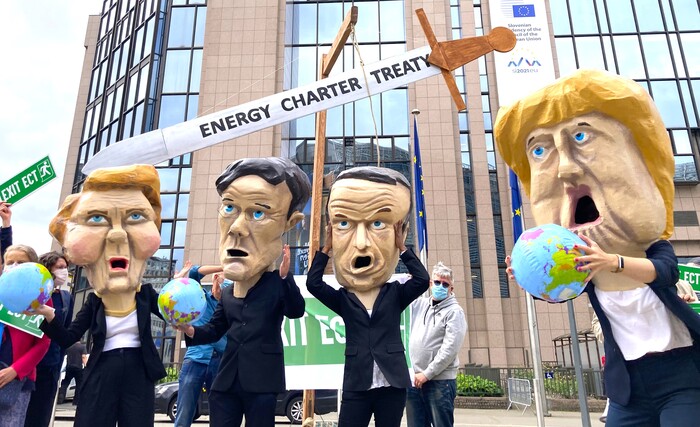|

 © Friends of the Earth, Flickr © Friends of the Earth, Flickr
Friend,
The Energy Charter Treaty (ECT) is an international agreement originally created with a focus on growing fossil fuel energy cooperation after the Cold War. Today, the Treaty is a major obstacle to effective climate action because it protects fossil fuel investments. By including investor-state dispute settlement (ISDS), the Energy Charter Treaty allows fossil fuel corporations to sue States that act to protect our climate when that action could impact a company’s profits.
Today, we celebrate because the European Council overwhelmingly adopted the EU’s proposal to exit the controversial Energy Charter Treaty (ECT), an outdated international investment agreement that protects and promotes fossil fuel investments.
CIEL and other organizations across Europe have worked tirelessly to educate European decision-makers about the dangers of the Energy Charter Treaty. Together, we proved how the treaty prevents effective climate action and is fundamentally incompatible with EU law.
This pivotal vote follows up an EU Commission’s proposal for the EU and European Atomic Energy Community to exit the Energy Charter Treaty.
The Commission found the ECT incompatible with the EU’s laws, investment policy and law, and energy and climate goals. Its proposal broke months of deadlock by offering EU countries the option to remain in the treaty while allowing other countries to exit. The European Parliament also adopted a resolution in April 2024 calling on the EU to withdraw from the ECT.
Today’s vote proves that people power can win critical victories!
Join us in celebrating this victory for the people, the environment, and the climate!

Why does this matter?
Fossil fuel investors have used the Energy Charter Treaty to sue States when they take climate action, claiming a right to compensation for alleged loss of investments. If they are serious about climate action, States must disentangle themselves from investor protections that allow fossil fuel companies to sue them in private courts when States act in the public interest to phase out fossil fuels. States could be squeezed from both sides: sued by communities for their climate inaction with ever greater frequency, and sued by investors when they do act to phase out the fossil fuel drivers of the climate crisis and accelerate the energy transition.
CIEL has worked for a long time to dismantle ISDS and ensure that the perspectives of communities inform ongoing arbitration.
Policymakers in Europe, and beyond, now have a duty to end their dependency on fossil fuels, exit the ISDS system that allows industry to sue States for enacting public interest policies, and accelerate the clean energy transition.
This win in Europe is a milestone in the fight against investor state dispute settlements. Now, we are leveraging this momentum for other States and clearing the way for effective climate action around the world.
Today we celebrate this victory with you. Tomorrow we will continue working to uproot the fossil economy driving the climate crisis, and the trade and investment deals that stand in the way of a renewable energy future.
Onwards!
With hope for the future,

Helionor de Anzizu
Staff Attorney
Environmental Health Program
Center for International Environmental Law (CIEL)

1101 15th Street NW, Floor 11, Washington DC, 20005
Phone: (202) 785-8700 | Fax: (202) 785-8701 | info@ciel.org
|